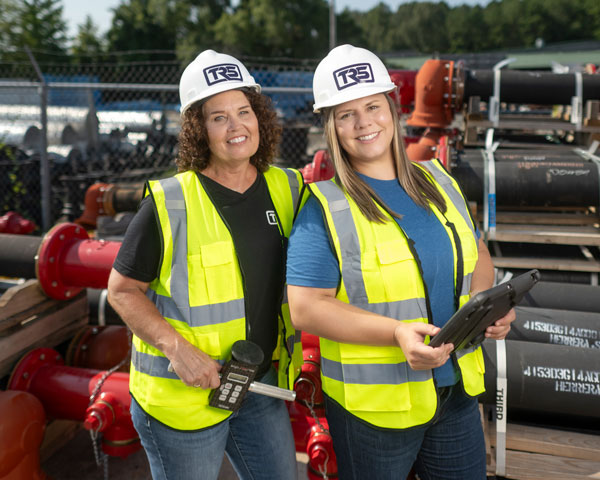Expert-Driven Solutions for a Safer, More Efficient Workforce
At TRS Worksite Solutions, our approach to injury prevention is rooted in data, clinical expertise, and real-world job insights. We specialize in analyzing the physical, cognitive, and environmental demands of work, helping employers define essential job functions, identify safety-sensitive roles, and uncover high-risk tasks that could lead to injury.
Our comprehensive services not only promote regulatory compliance (OSHA, ADA, EEOC) but also reduce downtime, lower workers comp and healthcare expenses, and protect your most valuable asset—your employees.

Physical Demands Analysis (PDA)
A Physical Demands Analysis is the cornerstone of an effective injury prevention strategy. Also referred to as a Functional Job Analysis, this process provides a detailed, validated evaluation of the physical, cognitive, and environmental requirements of a specific job role.
Performed by licensed professionals—Physical Therapists, Occupational Therapists, and Athletic Trainers—our PDAs offer:
- A breakdown of essential and non-essential job tasks
- Objective measurements of task frequency, intensity, and duration
- Identification of ergonomic risk factors and physical strain
- Clarification of safety-sensitive duties for compliance and testing
- Insight to support post-offer employment testing, accommodations, training, and return-to-work planning
- Task-specific training aids
This level of analysis ensures alignment between job expectations and human capabilities—creating safer work environments and stronger teams. PDAs are recommended to be reviewed and updated every 2–5 years to remain accurate and legally defensible.
Functional Job Descriptions (FJDs)
Our Functional Job Descriptions transform the findings from PDAs into clear, actionable documents that define:
- Essential job functions and physical demands
- Safety-sensitive job roles
- Cognitive and environmental factors that impact performance
- Job-specific training and educational requirements
- Compliance-aligned criteria for use in HR, safety, and clinical decisions
Validated by our team of healthcare professionals, FJDs form the legal and operational foundation for:
- Post-offer and fit-for-duty testing
- Return-to-work and transitional duty plans
- Reasonable accommodations under ADA
- New Hire Training Documents
- Consistent employee training and communication
FJDs also allow clinicians and safety teams to better understand job tasks across departments—enhancing coordination and decision-making.
Determining Safety-Sensitive Roles
Accurately identifying safety-sensitive roles is essential to maintaining both compliance and workplace safety—particularly in environments where physical performance directly affects the safety of employees, co-workers, or the public.
Our team performs detailed, validated Physical Demands Analyses (PDA) to objectively assess the physical, cognitive, and environmental demands needed to perform the essential job functions and requirements of each role. This data-driven process ensures that safety-sensitive designations are based on clear, task-specific criteria—providing employers with legally-defensible, evidence-based classifications aligned with regulatory expectations.
Why It Matters
Designating a position as safety-sensitive has direct implications for:
- Hiring practices and conditional job offers
- Compliance with drug and alcohol testing policies (DOT and non-DOT)
- Return-to-work decisions
- Accommodations and restriction management
- Workers’ compensation and liability exposure
Incorrect or subjective classification can expose an organization to regulatory challenges, legal risks, and unsafe working conditions.
The Importance of a Non-Biased Third Party
To ensure these determinations are objective, defensible, and consistent, we serve as a neutral third party — relying on standardized methodologies, job observations, and measurable data to:
- Eliminate bias from internal stakeholders
- Prevent over- or under-classification of job roles
- Support compliance with OSHA, ADA, and DOT regulations
- Create a documentation trail for legal and insurance purposes
We don’t guess or assume — we provide tangible, role-specific data that empowers your organization to make informed decisions with confidence.
From Analysis to Application
Once the safety-sensitive designations are determined, we work with your team to integrate findings into:
- Post-offer employment testing protocols
- Fit-for-duty and return-to-work evaluations
- Policy development and employee communication
- Accommodation planning and job matching
Why Our Approach Works
We apply a Sports Medicine model to industrial health—treating workers as industrial athletes and building strategies to keep them in the game. This unique lens, combined with our multidisciplinary expertise and boots-on-the-ground engagement, ensures our recommendations are not only compliant and strategic—but also realistic, actionable, and employee-focused.
Let TRS Worksite Solutions help you align your people, roles, and safety efforts with real-world job demands. Together, we’ll build a safer, more productive workforce—one job at a time

